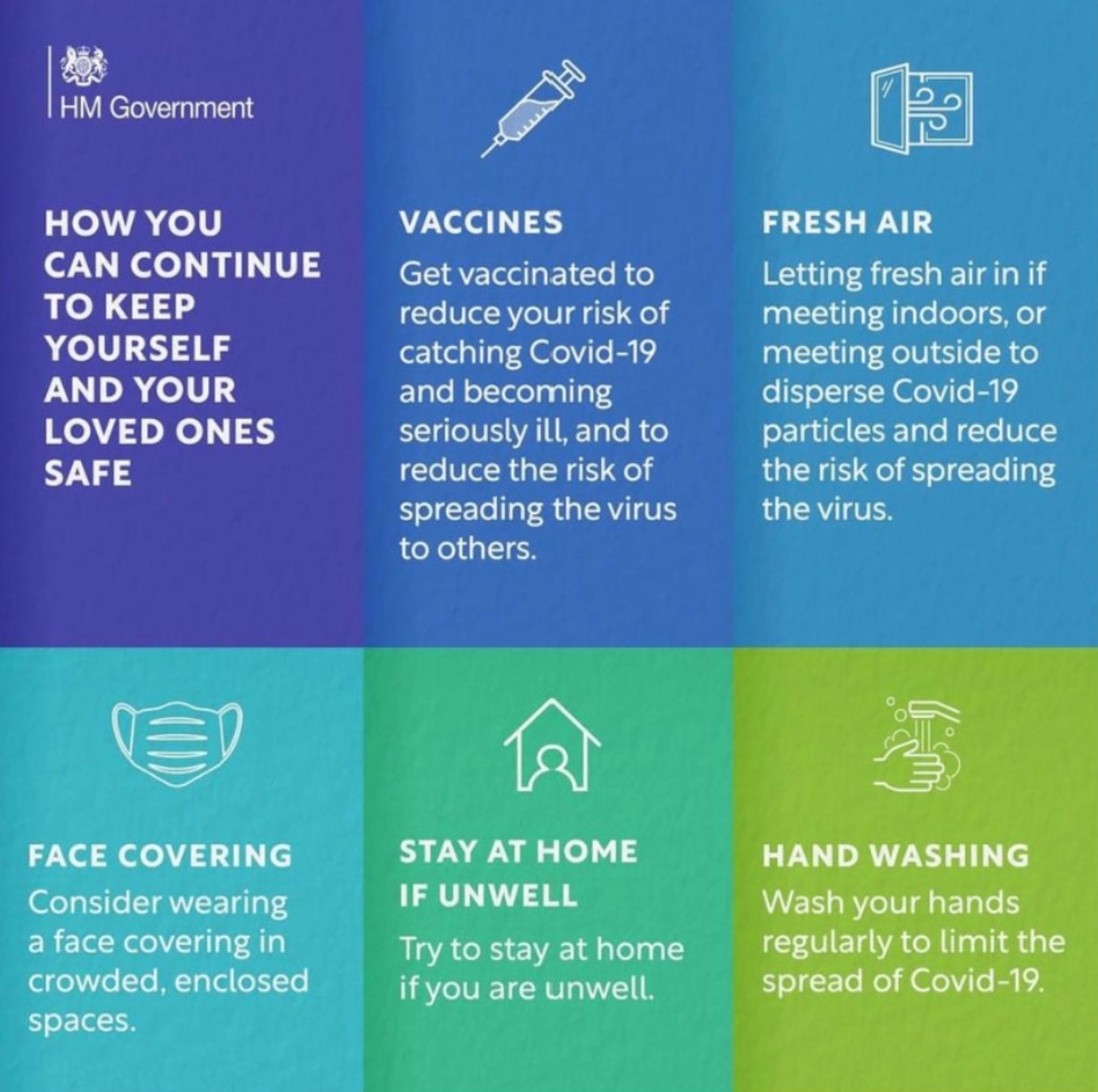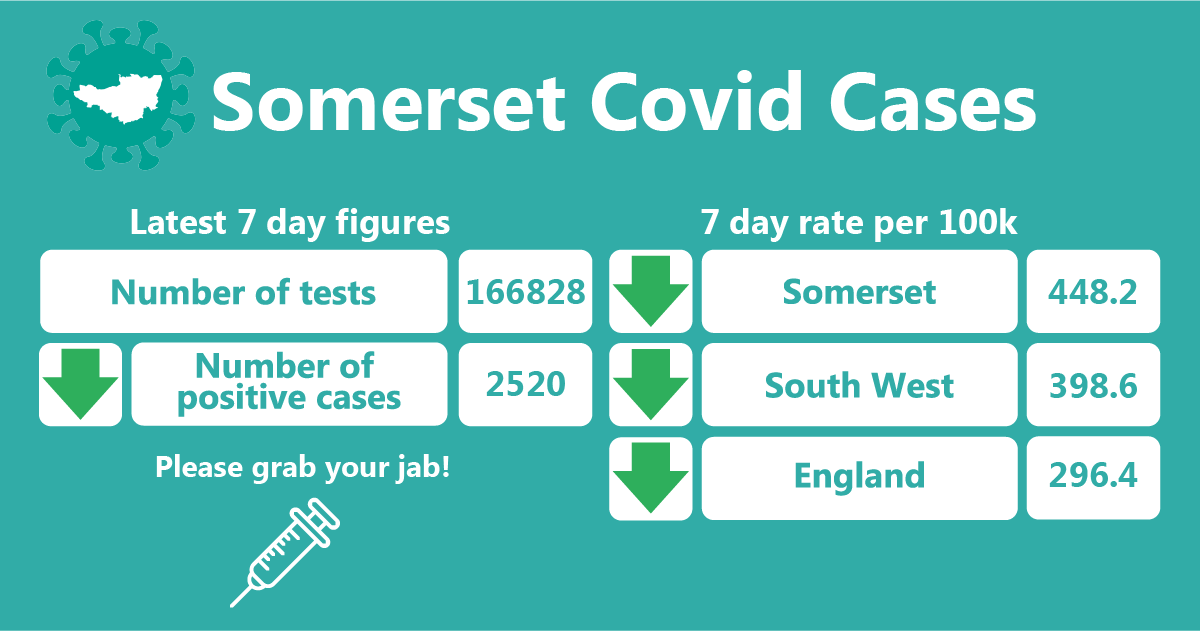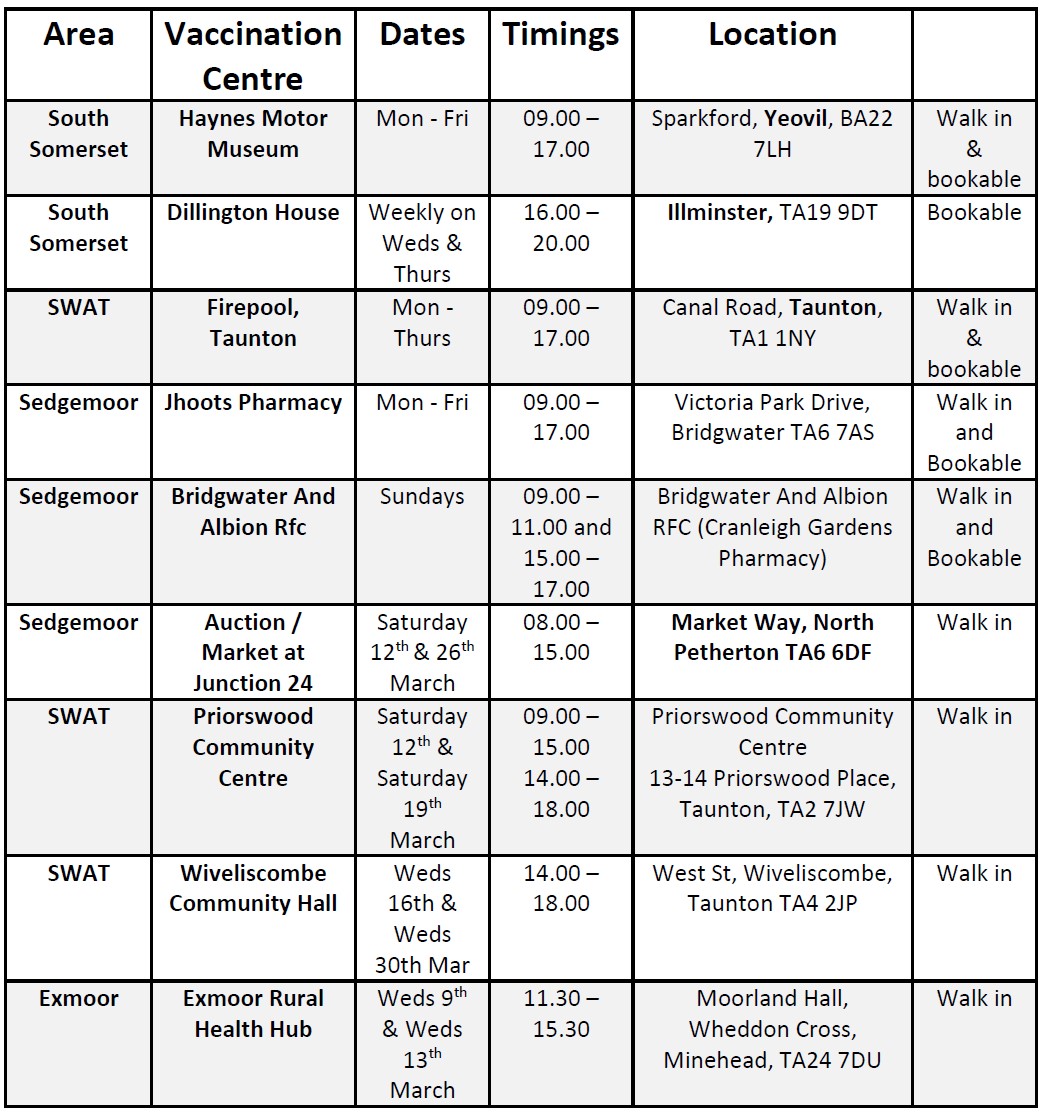|
|

|
Somerset's Covid-19 Update
Friday 4 March 2022
|
|
|
Welcome to the latest edition of the weekly Somerset Covid-19 update for key stakeholders and subscribers. This update is produced on behalf of the Somerset Covid-19 Engagement Board and is designed to provide a weekly update on the current Covid-19 situation in Somerset.
|
|
Please be aware you are receiving this email because you have previously subscribed to Covid-19 updates from SCC or were a part of the Stakeholder mailing list. If you no longer wish to receive these mails you can use the 'unsubscribe' link at the bottom of the update.
|
|
|
|

|
|
Leader Somerset County Council
|
|

|
Director of Public Health
|
|

|
Clare Paul
Cabinet Member for Education and Public Health
|
|
|
|
|
|
(The helpline is available from 8am to 6pm every day, including weekends).
|
|
|
|
|
|
|
Case numbers remain high across the County and it is important to remember we can all still help prevent the transmission of Covid-19, especially to the most vulnerable in our communities. Thank you for everything you have done so far.
|
|

|
Although most of the legal restrictions have been lifted, the SCC Public Health team still advise that basic infection control measures should be followed, as these will help slow the transmission of many seasonal illnesses and have a positive impact on reducing sickness levels and improving business continuity. These include keeping occupied spaces well ventilated, regularly washing your hands and wearing a face covering in crowded or indoor spaces.
|
|
|
‘Remember, everyone can catch it, anyone can spread it.’
|
|
|
|

|

|
The main items featured in this week’s update are:
|
- Schools, Workplace and Care settings
- Vaccinations Update
- Testing Update
- Covid Catch-up Film
- Resources and further information
|

|
|
|
Somerset Covid Cases
|
|
|

|
In the week ending 27 February, approximately 166,828 tests were carried out across the county. There were 2,520 new confirmed cases identified by these tests. The rates of Covid-19 in Somerset remain high but have decreased in the last reporting week to 448.2 per 100,000. This is above both the South-West average and the national average.
|
|
Hospitalisation data for Somerset has increased over the last week to around 62 Covid-19 in-patients in Somerset hospitals.
|
|
|
|
|
Please note the Public Dashboard is being reviewed following changes to the national policy. This week, the Office for National Statistics shows that around one in every 30 people have coronavirus, and in Somerset, we know our case rates are still high.
|
|
|
|
|
|
|
|
Schools & Early Years
|
Regular twice weekly LFD testing in mainstream education and childcare settings has been stood down as it is no longer proportionate, with the exception of special school settings. This is because we know that the risk of severe illness from Covid-19 in most children and most fully vaccinated adults is very low, and our successful vaccination programme has achieved a high rate of take-up.
|
|
|
|
Symptoms of Covid or a Positive Test: Children and young people who test positive for Covid-19 are advised not to attend their education setting while they are likely to be infectious. They should take an LFD test from 5 days after their symptoms started (or the day their test was taken if they did not have symptoms) followed by another one the next day. If both these test results are negative, they should return to their educational setting if they normally attend one, if they feel well enough to do so and do not have a temperature. They should continue to follow the guidance for their educational setting.
|
|
Welcoming children back to the setting: In most cases, parents and carers will agree a child with the key symptoms of Covid-19 (listed above) should not attend the setting, given the potential risk to others. If a parent or carer insists on a child attending your setting where they have a confirmed or suspected case of Covid-19, the school can take the decision to refuse the child if, in their reasonable judgement, it is necessary to protect other children and staff from possible infection of Covid-19.
|
|
|
|
Workplaces:
|
Covid sickness policies: With the requirement in law to isolate if you have Covid-19 now repealed, free LFD testing coming to an end for most workers from April, and a return to standard statutory sick pay rules coming later this month, you may be wondering what the implications for your business might be.
|
|
|
|
|
Do you want to reduce the number of staff absences from work?
|
|
Before Covid-19, people often went into work with cold and flu-like symptoms, inevitably spreading the cold virus to colleagues and customers and resulting in more staff off work or the virus affecting their work abilities.
|
|
What can we all do to change this?
|
|
As an employer you can make your policy clear, as the county council has done with its staff, that you should not come into the workplace with cold or flu-like symptoms, and work from home if you can. Let’s start to change the presenteeism culture.
|
|
What should a sickness absence policy consider?
|
|
In addition to the policy line, we need to consider the implications of the wider sickness policies, for example, will workers be substantially out of pocket if they take a few days sickness absence to self-isolate to protect the wider workforce? Each employer will need to consider how best to support staff to do the right thing for themselves and the business, as passing on Covid-19 (or any other virus) to fellow workers may well have business continuity implications.
|
|
Have you considered funding Covid-19 tests? People with the Omicron strain may show no symptoms, or if they do show symptoms, they are often just like other respiratory diseases
|
People with the Omicron strain may show no symptoms, or, if they do show symptoms, they are often just like other respiratory diseases such as the common cold and flu. The most common symptoms experienced are runny nose, sore throat, headache and fatigue, so without testing it is impossible to know if you have Covid-19 or a cold or flu. Some employers may choose to continue funding LFD tests, which will help them to stop Covid-19 spreading amongst their workforce and reduce further absences.
|
|
We encourage all business to consider their sickness absence policies and, very importantly, the culture they wish to have in place for how staff behave if they develop respiratory symptoms.
|
|
|
|
Care Settings
|
Despite the national removal of the legal requirement for people with Covid-19 to self-isolate, due to the higher risk nature of health and social care settings, the advice for residents and staff members working in these settings has not changed. Health and social care staff are required to follow the specific guidance for this sector and not guidance for the general population. The guidance can be found here.
|
|
|
|
|
The key guidance documents care settings are required to follow are:
|
|
It remains crucial to adhere to strict Infection Prevention and Control and continuing use of PPE, ensuring adequate ventilation, regular testing and ensuring staff, including any new personnel take up the offer of vaccination, including boosters. It is also important for visitors and essential care givers to follow good IPC measures and test prior to entering care settings to keep their loved ones free of Covid-19 and other infections.
|
|
|
|
|
|
|
|
There are bookings and walk-in clinics available NOW across Somerset.
|
|
|
|
|
|
|
Over 80% of eligible residents have received two doses of the vaccination. The Vaccination Programme is working with health and community partners to identify locations for mobile vaccination pop-up clinics. By localising the offer, the programme aims to reduce barriers to access and better understand community needs.
|
You can also pre-book an appointment. To do this, visit www.nhs.uk/Covid-Vaccination or call 119 for an appointment. The helpline has over 200 languages available if you or someone you know requires an interpreter.
|
|
NHS staff are ready to welcome you whether it’s for your first, second, or third dose.
|
|

|
Spring Covid-19 vaccine for most vulnerable
The Joint Committee on Vaccination and Immunisation (JCVI) advised an additional spring booster dose for the most vulnerable individuals in the population - those aged 75 and over, older care home residents and the over 12s who are immunosuppressed. Further info can be found here.
|
|
The UK Health Security Agency has published guidance to the spring Covid-19 booster offer for those aged 75 years and older residents in care homes.
|
|
People aged 75 years and older, residents in care homes for older people, and those aged 12 years and over with a weakened immune system will be offered a spring booster of the Covid-19 vaccine.
|
Appointments will be available through the national vaccination booking service shortly.
|
|
As legally mandated restrictions are being lifted, our first lines of defence (like vaccination) become even more vital. Vaccines remain our primary mitigating measure against severe disease and illness from Covid-19 and it is because of the success of the vaccination programme that we have been able to move into the next phase of living safely with Covid-19.
|
|
|
|
|
|
Vaccination for 5 -11 year olds
The Joint Committee on Vaccination and Immunisation (JCVI) has now advised a non-urgent offer of two 10 mcg doses of the Pfizer-BioNTech Covid-19 vaccine to children aged 5 to 11 years of age who are not in a clinical risk group.
|
|
Children aged five to 11 years old who are clinically at risk from coronavirus, or who live with someone who is immunosuppressed, are now eligible for a lower, paediatric dose of the Covid-19 vaccine. All eligible children will have been contacted by their GP or local NHS inviting them to book an appointment through a local booking system at their GP practice or a nearby vaccination centre. At the moment, this group will not be able to book through the national booking system.
|
|
|
|
|
Please note: If a child has tested positive for Covid-19 and is not at high risk from Covid-19, they need to wait 12 weeks before they can have a Covid-19 vaccine. This starts from the date they had symptoms, or the date of the positive test if they did not have symptoms.
|
|
|
|
|
|
|
|
|
Free testing in England will come to an end on 31 March, with most people having to pay for PCR and lateral flow tests from 1 April.
|
|
|
|
You can also call 119 free from mobiles and landlines. Lines are open every day, 7am to 11pm. 119 provides support in 200 languages. SignVideo is a free online British Sign Language (BSL) interpreter service for 119.
|
Although the Test and Trace Support Payment ended on 24 February 2022, anyone who was required to self-isolate on or before 23 February 2022, will have 42 days from the first day of their self-isolation period to submit a claim. For those applying, you check whether you are eligible for a support payment here: Claiming financial support under the Test and Trace Support Payment scheme.
|
|
From 24 February 2022, if you stayed at home due to a positive result for Covid-19 or because you are displaying Covid-19 symptoms, you may be eligible for other government support, such as Universal Credit and Employment and Support Allowance. More information can be seen at: https://www.gov.uk/browse/benefits.
|
|
|
|

|
This week Clinton discusses the lifting of legal Covid-19 restrictions following the recent announcement by the Government.
|
|
Please click the image below to watch.
|
|

|

|
The Somerset Local Outbreak Management Plan outlines how we, the council, will work with the NHS Test and Trace Service, PHE, the NHS and other partners to ensure a whole system approach to preventing and managing local outbreaks. This can be found here.
|
Please like us on Facebook, follow us on Twitter and LinkedIn and share our posts with your networks to help us communicate these important messages.
|
We would really welcome your feedback on this email update, so please email any comments to the team using GHaslock@somerset.gov.uk.
|
|
Finally, please follow Trudi Grant, our Director of Public Health’s Twitter account here.
|
|
|
|
|
|
|
|
|